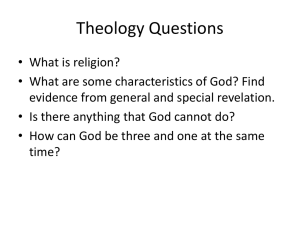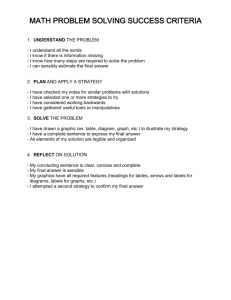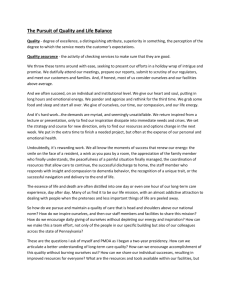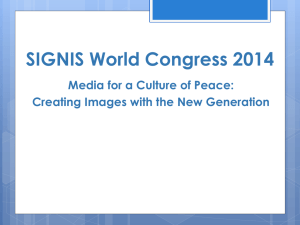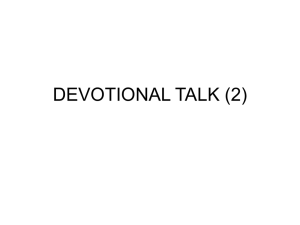Christian Identity
advertisement
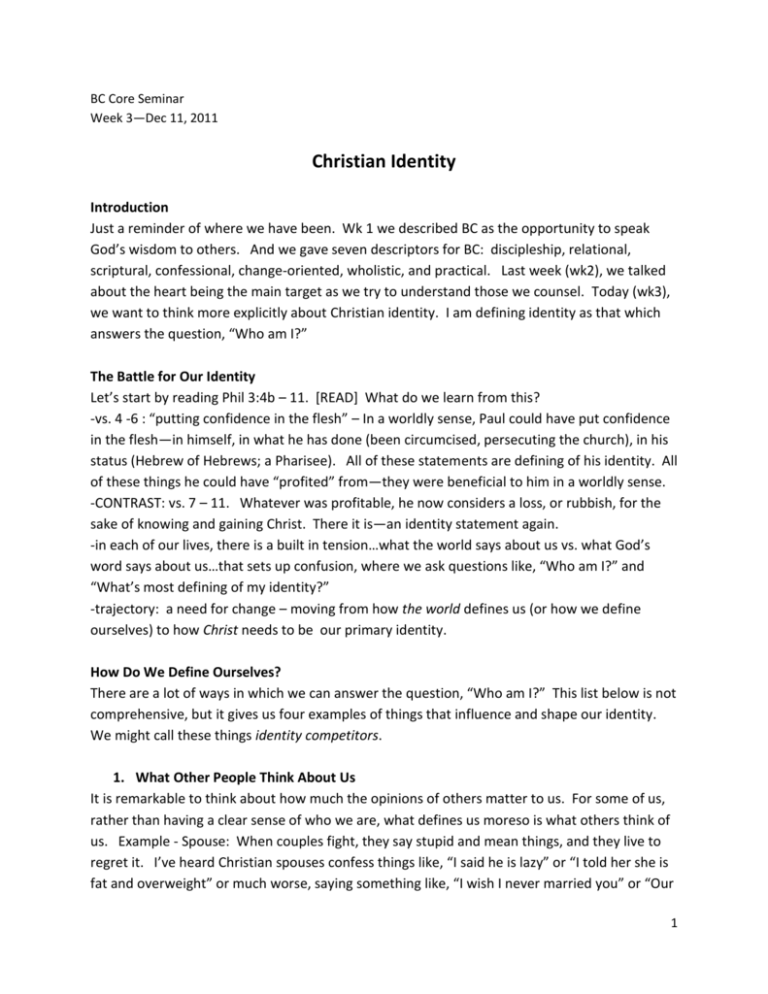
BC Core Seminar Week 3—Dec 11, 2011 Christian Identity Introduction Just a reminder of where we have been. Wk 1 we described BC as the opportunity to speak God’s wisdom to others. And we gave seven descriptors for BC: discipleship, relational, scriptural, confessional, change-oriented, wholistic, and practical. Last week (wk2), we talked about the heart being the main target as we try to understand those we counsel. Today (wk3), we want to think more explicitly about Christian identity. I am defining identity as that which answers the question, “Who am I?” The Battle for Our Identity Let’s start by reading Phil 3:4b – 11. [READ] What do we learn from this? -vs. 4 -6 : “putting confidence in the flesh” – In a worldly sense, Paul could have put confidence in the flesh—in himself, in what he has done (been circumcised, persecuting the church), in his status (Hebrew of Hebrews; a Pharisee). All of these statements are defining of his identity. All of these things he could have “profited” from—they were beneficial to him in a worldly sense. -CONTRAST: vs. 7 – 11. Whatever was profitable, he now considers a loss, or rubbish, for the sake of knowing and gaining Christ. There it is—an identity statement again. -in each of our lives, there is a built in tension…what the world says about us vs. what God’s word says about us…that sets up confusion, where we ask questions like, “Who am I?” and “What’s most defining of my identity?” -trajectory: a need for change – moving from how the world defines us (or how we define ourselves) to how Christ needs to be our primary identity. How Do We Define Ourselves? There are a lot of ways in which we can answer the question, “Who am I?” This list below is not comprehensive, but it gives us four examples of things that influence and shape our identity. We might call these things identity competitors. 1. What Other People Think About Us It is remarkable to think about how much the opinions of others matter to us. For some of us, rather than having a clear sense of who we are, what defines us moreso is what others think of us. Example - Spouse: When couples fight, they say stupid and mean things, and they live to regret it. I’ve heard Christian spouses confess things like, “I said he is lazy” or “I told her she is fat and overweight” or much worse, saying something like, “I wish I never married you” or “Our 1 marriage was a mistake.” You can see the power that these comments might have on you and how it would shape how you perceive yourself. Within bad marriages, where things are a mess, it is a fight to define ourselves by what we know to be true (Scripture or our personality or family traits) verses what our spouse says about us. 2. Our Jobs Our education and former training shapes the way we think. Interesting to meet an engineer, who will be more structural/analytical/logical versus an English major, who will be more philosophical and free-flowing. In regards to our jobs, what we spend an extra-ordinary amount of time and energy invested in will shape what we value and how we think. Summarized by the phrase - we are what we do. Sadly, often our self-esteem is wrapped up in what we do for work. Example – culture says that a woman’s life is more valuable if she spends her time in the workforce. Yet, I tell my wife, who is a homemaker, what she does will have a much longer lasting impact than anything I do. As the main nurturer in our home, she gets the opportunity to shape and define the character of our children every day, and that will bear fruit positively or negatively for years to come. 3. Self-talk You talk to yourself about yourself. Paul Tripp comments: “No one is more influential in your life than you are because no one talks to you more than you do. You're in an unending conversation with yourself. You're talking to yourself all the time, interpreting, organizing, and analyzing what's going on inside you and around you.…You are constantly involved in an internal conversation that greatly influences the things you decide, say, and do.” [Story: I was walking by the desk of another staff member, and he was muttering something to himself, and he looked at me and said, “They say talking to yourself is good for yourself.” I responded, “That all depends on what you say to yourself.”] As you talk to yourself about yourself, keep in mind that what we say to ourselves matters. Your self-talk shapes your identity and self-perceptions. Example: The dieting craze has captivated America for quite a few years. If someone is overweight, it is fair for them to make a pronouncement, “I’m overweight and need to lose weight.” But I’ve sat with many women who have had fairly distorted views of their body image, and despite being thin, they’ve been so influenced by the culture’s standards for body weight, such that they are not satisfied until they are bone thin. They say to themselves, “I’m overweight” or “The really thin girls get the attention”, when in reality they are already underweight. This just shows how a lot of bad fruit can be born from a heart that believes lies and preaches those lies to myself. 2 4. Psychological Labels Extremely popular in our culture are psychological labels, like ADD, PTST, clinical depression, bipolar, schizophrenia, etc. What are these labels? The DSMIV is the Bible of psychology and psychiatry. The psychological and psychiatry community have created these labels in order to two doctors, in different places (CA and NJ), could look at the same person and diagnose the same problem is. It’s a universally adopted set of standards that are used to identify life’s problems. As Christians, we can think of these labels as data collected by thousands of psychologists and psychiatrists and then collated into different typical sin patterns. These sin patterns have been given labels/names. The real danger of these labels is the power they hold over someone’s identity. When someone is diagnosed, that diagnosis tends to be the be-all-and-end-all of a person’s existence. Other elements of a person’s identity tend to fall into the background. [Story of Powlison with husband and wife. Wife finally asks, “Did you say OCD?”] OR [Example of young man who says, “It’s not my fault. I’ve got OCD.” Removing moral responsibility from himself and giving it away.] How Does the Bible Define our Identity? We have been pursuing the idea of identity, answering the question, “Who am I”? What you find as your counsel others is that there are a variety of things that shape and define how they understand themselves. Experiences, parents, ethnicity, family, education, work—all have some impact on our identity. Some have a larger influence than others. I defined these things as identity competitors, i.e. they compete in shaping and defining who we are. What are they competing with? First and foremost, Scripture, or God’s perspective on things. Where we often get in trouble in life is when we let the things of this world— experiences, abuse, ethnicity, family, education, work, psychological labels—become more important and influential than Scripture. As Christians, we want Scripture to be the most authoritative in shaping and defining our understanding of ourselves and our understanding of reality. We want the authority of the text to define our identity. Objective truth is a better way to define our identity. We look outside of ourselves to something that is not tainted by human subjectivity or sinful human motives. We find objective truth in the Bible because it is God’s very own Words. God does not lie. He is truth. He is authoritative over all things because he is Creator and Redeemer. Because God himself does not lie, he is always truthful, and fully authoritative—we expect that our identity can be more soundly defined as we look at our ourselves through God’s lenses. 3 As Christians, identity confusion occurs when we let the things of this world define us more than God’s Word. Much of the dilemma is that our experiences and our own personal interpretations about life become authoritative in how we define ourselves. What I know to be true does not matter. What my parents said, or how I was trained, or how I feel (despite how irrational they might be at times), or what label I’ve been given by a psychiatrist, or what I say to myself, all of those things become more important than God’s Word. They can temporarily rule the day. [PAUSE FOR QUESTIONS] Thinking Biblically/Theologically About Our Identity As Christians, we want the Word to shape and define who we are. Scripture gives us some fundamental categories to shape our identity. One classic (and very biblical) way to do theology is C-F-R. We want to let biblical history define who we are as Christians. My goal here is simply to show you how theological categories are extremely relevant in defining our identity, and hopefully, is more valuable in our minds as Christians. Creation (i.e., we are created human beings) Several points flow from this truth: (1) As created human beings and image-bearers, we have a dignity and worth that separates us from all of rest of God’s creation. Application: Abuse in any form is a horrible distortion of what God intends – i.e., parents lovingly and responsibly stewarding the gift of children, creating a secure environment where children grow up knowing they are loved. Children who are physically or sexually abused grow up with a sense of worthless-ness. As adults, these same abused children think things like, “I am trash” or “I’m not worth anything” or “No one could ever possibly love me.” As image-bearers, we have dignity and value because of who God made us to be. One of the means in which God uses to instill that sense of dignity and value is through our families. Abuse obliterates that sense of being a dignified and valued image-bearer. (2) As created human beings, we are revelation receivers. We often think of the Word as necessary because of our sin, but the plain reality is that humanity needed God’s Words from the beginning. In Genesis 1, the story of creation is built around one simple phrase: “And God said...” (Gen 1: 3, 6, 9, 11, 14, 20, 24, 26). There is an interruption to the cadence of this narrative when, after God created Adam and Eve, he talked to them (Gen 1:28; 2:16-18). / Adam and Eve were created to be revelation receivers.i They could not live apart from God’s Word. God gave man and woman specific guidance for their lives in the Garden. “Be fruitful and increase. Subdue the earth. Eat from any tree, but not that one.” We don’t know what 4 would have happened if God had never spoken, but we should shudder to even think of life apart from God’s Word. / Out of his great mercy, God did speak to man. He spoke to man first in the Garden. And then through Moses and the prophets. And finally, through his Son. “Long ago, at many times and in many way, God spoke to our fathers by the prophets, but in these last days he has spoken to us by his Son” (Heb 1:1-2). Fall (i.e., we are sinners) The image is shattered; it is tainted by sin. We fall out of God’s favor (because of original sin, which they inherited from Adam and Eve, and their own transgressions) And we are now under God’s wrath because of our sins. This means our affections, motivations, and thinking are out of sync with God. Yet we are still in God’s image, and therefore can still know God and be forgiven by him. (1)Sinners are self-worshippers. Application: Fundamentally, if we boil our identities down to one thing, we could say we are worshippers. The question is not if we worship, but what we worship. Our sin causes us to be oriented away from God, and it makes us put ourselves as the centerpiece of our world. “I” am more important than anything else in my life. [Story about Eden declaring, “I love myself.”] Sometimes self-worship shapes our identity in more explicit ways – you manipulate our spouse or friends to do what you want. Sometimes it comes out in more subtle ways – at a party, you try to tell the funny stories, not just because you are funny, but in reality you like being the center of attention. (2) Sinners are self-deceived. Application: Christians have “blind spots”— ways in which we as believers live in ignorance of indwelling sin and its harmful effects on their life. Ignorance is the key term here. Sin can make me blind to my own faults. Sin causes me to be deceived about the depth and breadth of the problems in my life. What are the blind spots in your own life? Nature of blind spots is that we are blind to them. Good way to fight sin is to grow in knowledge of those blind spots. Redemption (i.e., we are redeemed) Christians repent and trust in Christ. If you repent and trust in Christ, you become a part of God’s family and our image is conformed to be more and more like Christ. (1)As redeemed men and women, we are transformed into God-worshippers. Application: Regeneration and conversion leads to a new heart. God captures our heart. Transformed hearts lead to transformed desires and abiding fruit. We long for things we didn’t long for before—to be in God’s Word, to love God’s people, to serve rather than being served. Transformed hearts means we are no longer what we once were. Whatever our fundamental 5 associations were before need to change. In reality, the NT says now we are completely new creatures—i.e., our affections are now re-oriented so that we love God more than we love ourselves. For some, the shift in identity is rather drastic. Their life is radically turned around. Old associations are a distant past, and new associations now dominate the ways we think and even feel. For others, there is a slow ramping up. Our heart is changed, but our ignorance of the Christian life causes us to grow in small steps rather than drastic leaps and bounds. Both ways are okay. Both are ways in which God reorients who we are, so that we grow to love him more than anything else. (2) We are redeemed sinners. Application: Even after conversion, we are a strange mixture of both redeemed and sinful. You’ve heard of the conversion stories, where the alcoholic suddenly stops drinking upon conversion. For most of us though, residues of our sinful past still linger long after we are converted. The same heart that lived as a non-Christian for years established sinful habits, patterns, ways of thinking, and these don’t always go right away when we are saved. Redemption is a process of gradually, consistently, patiently rooting these things out over the course of a lifetime. The promise of Rom 6 is the grace will win in the end. Over the course of our life, sanctification looks like a stock market chart, i.e., it’s not a straight line, but gradual growth, with some days better than others. Practically What Does This Mean for Me? How Do I Help Others with this? Practically what does this mean? How does this affect the way to speak wisdom in other people’s lives? When you counsel others: 1. Be careful spending all of your time talking about horizontal parameters— circumstances, human relationships, background information, feelings-thinkingvolitional choices. You obviously want to be very deliberate about injecting biblical thinking and conversation into your discussions. Be careful because you can easily underestimate our ability to spend most of our time in the horizontal—talk about relational dynamics, the nature of our problem, our frustrations and disappointments, our desires and hopes, etc. Be very deliberate in shifting conversations in a vertical, Godward direction. As you talk, simple questions like, “How does God relate to this?” can shift the focus. 2. Be careful spending all of your time talking about horizontal parameters— circumstances, human relationships, background information, feelings-thinkingvolitional choices. You obviously want to be very deliberate about injecting biblical thinking and conversation into your discussions. Be careful because you can easily underestimate our ability to spend most of our time in the horizontal—talk about relational dynamics, the nature of our problem, our frustrations and disappointments, our desires and hopes, etc. Be very deliberate in shifting conversations in a vertical, 6 3. 4. 5. 6. Godward direction. As you talk, simple questions like, “How does God relate to this?” can shift the focus. These theological categories are not the categories we most often talk about when we think of our identities or even talk about our identities with others. The identity competitors are more of what we deal with when we think about who we are. My encouragement to you is to be more deliberate in thinking about yourself in theological parameters, or in your conversations with others. Be careful to think about what is authoritative or most influential in a person’s identity. Ask yourself fundamental questions like: “What has the greatest influence on this person’s self-understanding—his work, his family background, an abusive background, OR, his love for God’s Word, his desires for the church, his love for God’s people?” This question about authority and influence will lead you to a person’s functional identity. While I might call myself a Christian (the term Christian is a self-label for my identity), in reality, something else may dominate the way I think. You get to see what really rules their life (Matthew 6:21). You might be really surprised at what some Christians believe about themselves. How they define their own identity is much more important than how God defines their identity. I’ve had Christians say things like “I am trash” or “I ruin everything” or “I am worthless” or “I hate myself” or “I’m a lost cause.” This is much more than them thinking of themselves as a worm or wretch or the chief of sinners. In their minds, they are so horrible that they think that they are even beyond God’s grasp. When you take time to understand what has been most influential in another Christian’s identity, you also need to ask the why question. Why has that thing—whatever it is— risen to a place of great importance? What can help me understand its place of importance? [PAUSE FOR FINAL QUESTIONS] Paul Tripp originally coined the term “revelation receivers” in his helpful book Instruments in the Hands of a Redeemer (2002), p. 40. i 7


